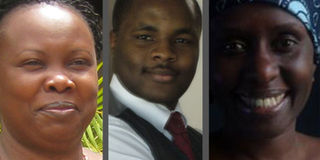Locating the Ugandan artist in poet Okot P’Bitek’s essays

L-R: Goretti Kyomuhendo, Busingye Kabumba and Juliane P’Bitek
It is said Okot P’Bitek put the last full-stop on the manuscript of a collection of essays - Artist the Ruler; Essays on Art, Culture and Values on July 6, 1982. He was to die two weeks later.
The essays, published in 1986 by the East African Educational Publishers Ltd, have been described as P’Bitek’s last ammunition in all battles fought in his intellectual life.
In an interview with Prof. Bernth Lindfors published in 1981, P’Bitek said:
“All (his) writings, whether they are anthropological monographs, studies of religion, essays, songs, poems, or even traditional stories and proverbs … are ammunition for … the battle to decide where we here in Africa are going, and what kind of society we are building.”
The 14 essays cover the major themes P’Bitek is revered for worldwide, such as religion, Acholi aesthetics, philosophy, culture, art and literature. The collection ties together all bits of P’Bitek the poet, the novelist, the singer, the philosopher, the writer and the thinker.
The essay ‘Artist, The Ruler’ starts with P.B Shelley’s statement that “Poets are the unacknowledged legislators of the world.” P’Bitek qualifies Shelley’s statement by insisting that in the Africa of tradition, poets are fully acknowledged, admired and feared for their sharp tongues.
This tradition has, however, undergone several changes that by casually looking at the position and influence of artists in the Ugandan society today, one can easily dismiss Shelley and P’Bitek’s claim as a wish.
The Nanga instrumentalist, the village dancer and singer are no longer the immediate images of an artist in Uganda. The artists of the Africa of tradition and their art have been relegated to tourist centers where some people, bored in their civilisation in Europe and elsewhere, come to spread pity and feel good that they have seen an Africa lost in merry-making and ancient practices.
Artist relegated
This “commoditisation” of African culture and art is not spared by P’Bitek in his essays. Culture, according to P’Bitek, is lived and not exhibited at shows and theatres, and cannot be a subject of government policy. The relegation of the African artist of tradition however, does not mean that there is no artist involved in shaping the philosophies and ideas that inform the Ugandan society.
The “new” Ugandan artist, despite learning his art from the temples of cultural imperialism that are euphemised as schools and universities, copying and imitating the art of elsewhere, and the inability to question, reflect on and discuss his society, still mirrors the philosophy or lack thereof, of Ugandan society. In recent times, lyrics of Joseph Mayanja (a.k.a. Chameleon’s) Basiima Ogenze song can be heard from the lips of policy-makers while they execute law-making errands.
The judges may not make reference yet to Paul Job Kafeero’s philosophical and neatly written lyrics as evidence of philosophy that should inform laws and norms that govern our society, but there is hope that some proverbs that get used by some judges is evidence of the realisation of the need to ground laws in the viewpoint of life of Ugandans.
It will not, however, take mere hope for today’s artist to enjoy the influence their counterparts in the Africa of tradition.
The artist of today must think deeply about the form, content and nature of his art and society. In the essay What is Culture?, P’Bitek states that song and dance, poetry and fable have deep meaning when they reflect and celebrate a society’s philosophy of life and when members of that society see in that art things that are, things that should be and things that they relate to.
==============================================
Goretti Kyomuhendo –author of novels-Secrets No More, The First Daughter and Waiting.
“I read Song of Lawino and Song of Ocol during my secondary school days and I remember thinking: I wish I could read (and speak) Luo so I could read the story in its original version. And my wish then was to meet Okot P’Bitek but of course I never did. Song of Lawino is still the most widely read (and respected) literary work to have come out of Uganda to date. It is a cultural clarion and apart from its literary value, it is a story that celebrates African culture. Someone should make a movie out of his work.”
==============================================
Mildred Barya Kiconco—Poet and author of Give Me Room to Move my Feet
“His works have impacted me, and I would hope others too, to be aware of the marriage between two literary traditions, and what each is doing in the text: oral and written traditions. Orature and written literature structure culture differently. P’Bitek knew how to borrow techniques from oral literature and use them as narrative strategies--metaphors, voice, intention and so on--in the written text. So he has remained significant in contemporary studies and also in the classic sense. He is relevant in the way he understood the power of storytelling; it’s influence on people, whether in poetry, prose or in the written literature. On the surface I may have questioned why his characters are fixed and archetypal, instead of being fluid and more complex. But then the times needed representational characters. His books should be printed and everyone who can read should buy a copy. Perform his poems …turn his residence into a vibrant writers’ house.”
==============================================
Beatrice Lamwaka—writer and author of Butterfly Dream.
“I first read Song of Lawino then Wer pa Lawino. The Acholi version is more powerful, more authentic, more awesome, more meaningful to me and I could relate with the things that Lawino was talking about. This is a good example of writing in the mother tongue. I am glad I was able to read in both languages. P’Bitek wrote for us a template, we can now update it since language changes. He is very relevant and will be for many years to come. I grew up knowing that writers were white and dead. Although, I didn’t meet P’Bitek, he taught me that the Acholi culture was beautiful and I had to write about it. My culture is embedded in my writing/stories. For me, his writing is my bible of sorts. Reading and reciting his poetry would be a great way [to commemorate his work]. Making his work available would perhaps make Ugandans appreciate literature more.”
==============================================
Busingye Kabumba, lawyer, author of Whispers of My Soul
“I particularly identified with P’Bitek as a fellow Budonian, Oxonian and more
importantly as a lawyer/poet. His literature for me exemplified the possibilities for ‘ownership’ of English in the tradition of Chinua Achebe and Gabriel Okara - African writers could work in English to tell an authentically African story.
==============================================
Juliane P’Bitek---poet and daughter of Okot P’Bitek.
“I have read Okot P'Bitek but I've never had the opportunity to study any of it in school. His poetry continues to confirm that we all have voices and we should sing out loud and proud. His essays, especially the collection Artist the Ruler, continues to teach me about the role of the African intellectual today. We would be fools to think that his works are of no consequence today, especially since they confirm that we have the capacity and capability to think. I love my father and I'd never publicly denounce his name anymore. I think my father would best be celebrated by continuing to invest in formal and informal education, especially in northern Uganda where there's a lag in the percentages of literacy.”




